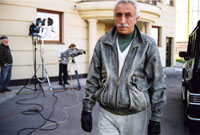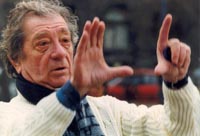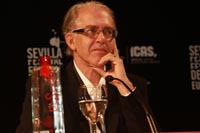23.06 - 02.07.2011
Main competition Jury

GERALDINE CHAPLIN
actress
She was born in Santa Monica, California in the family of the famous actor Charles Spencer Chaplin and his wife Oona O’Neill (daughter of playwright and Nobel laureate, Eugene O'Neill). Chaplin graduated from a boarding school in Switzerland where she became fluent in French and Spanish. When Chaplin was eight years old, she appeared uncredited in her father's film Limelight (1952), but dreamt of a ballet at the time. She educated in the Royal Ballet School in London and later spent some time on a ballet stage in Paris.
Her acting career launched again in 1965 when director David Lean casted her for the role of Tonya, the main character's wife in his adaptation of Doctor Zhivago. For this role Chaplin was nominated for a Golden Globe for the first time; in 1967 she has also made her debut on Broadway stage. Today Geraldine Chaplin is an acknowledged star of world cinema: throughout her career the actress has been working not only in USA, but in Spain, France and United Kingdom, collaborating with such famous directors as Jacques Rivette (Noroît (1976) and L'amour par terre/ Love on the Ground (1984), Alain Resnais (La Vie est un roman/ Life Is A Bed of Roses (1983) and I Want to Go Home (1989), Robert Altman (Nashville (1975), Buffalo Bill and The Indians, or Sitting Bull's History Lesson (1976), A Wedding (1978), Martin Scorsese (The Age of Innocence (1995), Franco Zeffirelli (Jane Eyre (1996) and many others. One of the most significant page of Chaplin’s biography is her long-term collaboration with Spanish director Carlos Saura – she participated in his famous films Ana y los lobos/ Ana And the Wolves (1973), Cria cuervos / Raise Ravens (1975), Elisa, vida mía / Elisa, My Love (1977), Los Ojos vendados/ Blindfolded Eyes (1978).
In 1992 she took part in Richard Attenborough’s film Chaplin about her famous father – Geraldine played the part of the actor’s mother, Hannah Chaplin and once again was nominated for a Golden Globe. Up to date Chaplin’s filmography consists of more than hundred roles. One of her most notable recent roles was in Juan Antonio Bayona’s mystery thriller El Orfanato/ The Orphanage (2007), where the actress has once again demonstrated her talent of creating a remarkable character even in a small role – for a part of a psychic Chaplin received several awards. Among other multiple prizes that Geraldime Chaplin has ever received are prestigious Goya Award for En la ciudad sin límites / The City Of No Limits (2002), prizes at film festival in Munich, Paris, Best supporting Actor for ¿Para qué sirve un oso? (2011) in Festival de Malaga, Lifetime Achievement Award of Malaga Spanish Film Festival, the French Republic state award «Ordre des Arts et des Lettres», Officier grade, and award of the king Juan Carlos I «Medalla de Oro al Merito en las Bellas Artes».

AMOS GITAI
director
To date, early 2010, the work of the filmmaker Amos Gitai includes over 80 titles created over 38 years. But over and above his output and longevity, his entire body of works, which also includes video productions, stage sets and books, is remarkable for its diversity. He was born in 1950, the first generation of children following the creation of the state of Israel, a generation which was subsequently shaped by the great anti-establishment youth movements of the 1960s. His work as a professional filmmaker was launched with a film on the reconstruction of a house: HOUSE (1980) is a documentary which, in the unique location of a building site in a small street in Jerusalem, depicts with vigour and sensitivity much behind the lives, dreams and suffering of Israelis and Palestinians. Bayit / House (1980), A House In Jerusalem (1998) and News From Home, News From House (2006) are the three elements of this documentary trilogy, the same genre as the three Wadi films (1981, 1991, 2001), the trilogy on Israeli politico-military practices - Yoman sadeh / Field Diary (1982), Te'atron hahaim / Give Peace A Chance (1994), The Arena Of Murder (1996), the trilogy on the procedures of global capitalism – Ananas / Pineapple (1983), Bangkok-Bahrain / Labour for sale (1984), Orange (1998) and the trilogy on the reemergence of the extreme right in Europe - In The Valley Of The Wupper (1993), In The Name Of The Duce (1994), Queen Mary ’87 (1995). But he also produced fictional trilogies: the exile trilogy Esther (1985, Grand Prize of Toronto FF), Berlin-Yerushalaim (1989, Special Mention at the Venice FF, Special Prize of the Jury at Istanbul FF), Golem, l'esprit de l'exil / Golem, The Spirit Of Exile (1991), the cities trilogy - Zihron devarim (1995), Yom Yom (1998, Best Israeli Feature Film award at Jerusalem FF), Kadosh (1999, Palme d'Or nomination, Silver Screen Award at Singapore FF), the trilogy on historical events decisive for Israel – Kippur (2000, Palme d'Or nomination), Eden (2001, nomination for a Golden Lion award at Venice FF), Kedma (2002, Palme d'Or nomination), and the trilogy on borders - Promised Land (2004, CinemAvvenire' Award at the Venice FF), Free Zone (2005, Palme d'Or nomination), Disengagement (2007). Israeli filmmaker and citizen of the world, Amos Gitai resides in Haifa and Paris but lives and works throughout the world. He is now one of the most respected filmmakers in the international arena and in his work he constantly explores new narrative methods and styles, always associated with contemporary reality, even when the script takes a detour through a historical or mythological past.

NIKOLAY DOSTAL
director
Nikolay Dostal was born the 21st of May in 1946 in Moscow, in the family of the director Nikolay Vladimirovich Dostal. In 1970 he graduated from the journalistic department of the Moscow University, and started working as a second-unit director on the Mosfilm Studios. In 1981 Dostal graduated from Georgiy Danelia’s workshop of the Higher Courses for Directors and Scriptwriters, and one year later made his directorial debut with the film Ojidaetsya poholodanie i sneg. It was followed by such features as Chelovek s akkordeonom/ Man with an Accordion (1985), Shura i Prosvirnyak/ Shura and Prosvirnyak (1987), Ya v polnom poryadke/ I'm Alright (1989). International success came to Dostal with his next feature film, Oblako-ray/ Cloud Heaven (1990), which has received many prizes both in Russia and worldwide, including Silver Leopard at Locarno film festival and award of the National film festival Kinotavr. Among his other most famous directorial works are films: Malenkiy gigant bolshogo seksa/ A Small Giant of Big Sex (1992), Melkiy bes (1995), Politseiskiye i vory / Cops and Robbers (1998), Kolya – Perekati-pole (2005, the first prize of the Film Festival “Okno v Evropu”), Petya po doroge v Tsarstvie Nebesnoe / Pete on the Way to Heaven (2009, Golden George of the 31st MIFF, nomination for Golden Eagle Award of the National Film Academy for the Best Film), and popular TV-series: Grazhdanin nachalnik (2001), Stilet (2003), Shtrafbat / The Penal Battalion (2004, Russian TV Academy Award TEFI, Reflet d'Or of the 11 Geneva TV films Festival Cinema tous Ecrans for the best TV-series ) and Zaveshchaniye Lenina (2007, Golden Eagle Award for the Best TV-series , Nika Award for artistic TV achievments . In 2008 Nikolay Dostal was praised with People’s Artist title.

Károly MAKK
director
Makk was born in 22.12.1925 in Berettyóújfalu, Hungary. Being the son of the projectionist, Makk got the chance to get to know cinema from his childhood. He came to work to the film studio Gunniya in the summer of 1944. Even before he entered the Academy of Performing Arts he was already keen on cinema, having worked as cameraman assistant, trainee-editor, director assistant and created shorts for cine-magazines. In the same time Makk was studying in the university (first in Budapest and then in Debrecen) where he was in the department of art history, philosophy and aesthetics. In 1946-1950 he studied in the Academy of Performing Arts, working at the same time in cinema. While being the student, he met with the director Géza Radványi – Makk worked as an assistant director to him on the shooting of his film Somewhere in Europe (1947).
In 1949 Makk made his first film Uttorok, which was shattered by the studio before it was finished. Also Makk was fired from the studio, and in the early 50s he had to work as a tractor driver. He later came back to cinema and joined the Hungarian Film Production Company (MAFILM) in 1952 as a co-director.
He directed his first feature film, Liliomfi in 1954. Later Makk made a sort of his own trademark out of combining lyrics and grotesque, which can be seen in such films as Catsplay (1974, nomination for Oscar), A Very Moral Night (1977), etc. His film Ward No. 9 (1955), which deals with social issues, reveals the influence of Italian neorealism and the director’s ability to depict social environment and characters. His dark melodrama The House Under the Rocks (1958) received the Prize of International Film Festival in San-Francisco. The following features, such as The Brigade No. 39 (1959), The Fanatics (1961), Paradise Lost (1962), The Last But One (1963), were the masterpieces of its time, in which the director’s style was formed and shaped. Makk’s talent in creating atmosphere and social environment can be seen in his masterpiece, Love (1970), which received multiple awards, including Special Jury Prize of Ecumenical Jury at Cannes Film Festival, Golden Medal in Varna FF, and the Prize for Best Actress in Chicago. One of the most significant works of the director is also the feature film Another Way (1982), which received the FIPRESCI Prize in Cannes, as well the Prize for Best Actress, and Grand-Prix of Figueira da Foz Film Festival.
Makk depicted the time, following the defeat of Hungarian uprising in 1956, in his film Hungarian Requiem (1990). In Hungarian Pizza - his part of the film-omnibus Love Each Other (1995) – Makk showed his vision on the contemporary social relations. His film The Gambler (1997) is famous for brilliant acting work (the actress Jodhi May was awarded at the Troia Film Festival), as well as for its unique combination of the scenes from the original novel and the episodes of Fyodor Dostoevsky’s life. Makk’s nostalgic melodrama A Long Weekend in Pest and Buda (2003) participated in competition of the 25th Moscow Film Festival.
Since 1951 he has been lecturing at the Academy of Performing Arts, where he is now professor. In 1991 he was the speaker of the Democratic Charta. Since 1993 he has been a member of the Széchenyi Academy. He is a professor at the Academy of Theatre and Film Art, member of the Hungarian Academy of Art as well as of the European Film Academy. Makk is the winner of numerous prestigious awards. He has received Lifetime Achievement Award at Figueira da Foz IFF (1986), Hungarian Film Week (1994) and Karlovy Vary IFF (2001).

Javier Martín-Domínguez
festival director, director, writer
Javier Martín-Domínguez was born in Spain in 1954. He is the director of the Seville European Film festival (SEFF) and has developed a career in journalism, television and film, as director, producer and scrip-writer. He earned a degree in Communications and Journalism at the University of Madrid and a Master on Media and Film at The New School University of New York.
Martín-Domínguez has pursued a very successful career on Spanish TV. In 1976 he began to work for TVE – the main group of television in Spain. Through the following years he experienced a very successful career on television, where he became director of development and thematic channels at the Spanish Public television, and then in 2005 - secretary general of TVE. He also created TV formats for different networks in Spain.
He received the Principe de Viana award for audiovisual creation and the Internaional Jornalism prize Cirilo Rodriguez. He was a foreign correspondent for Spanish public radio and television in New York for a decade, and Far East correspondent, based in Tokyo, for the Barcelona newspaper La Vanguardia. He also was the editor in chief of the magazine Comunicacion XXI, and currently writes a weekly column about cinema and media on the Spanish press.
Javier Martín-Domínguez is also the writer and director of films. He had directed and produced numerous documentaries: More than a witness, The XXI century museum, The Last Word, A place to dream, Madrid-USA, etc. His biopic of the American writer Paul Bowles and his wife Jane Auer Bowles, Traces of sand and wáter has been shown at the Cinema du Art festival in París, Amsterdam, Boston, Tangiers and other festivals. With his fiction film De la piel pa´ dentro/ Within the skin he won the first prize of the Pamplona Festival. Other titles written and directed by him are Art East, Improvisators of Illusions (both shot in New York) and Eclipse. He also directed the promotional film of the Universal Exposition of Seville in 1992.
In 2008 Javier Martín-Domínguez became the director of Seville European Film Festival, which launched in 2004 and has been rapidly consolidating as a local event with the ambition to become a key Southern reference point for Euro filmmaking. Martín-Domínguez’s assignment for the role of its director, contributed in building on Seville Film Festival’s reputation as a solid and wide-ranging Euro showcase.





No hay comentarios:
Publicar un comentario